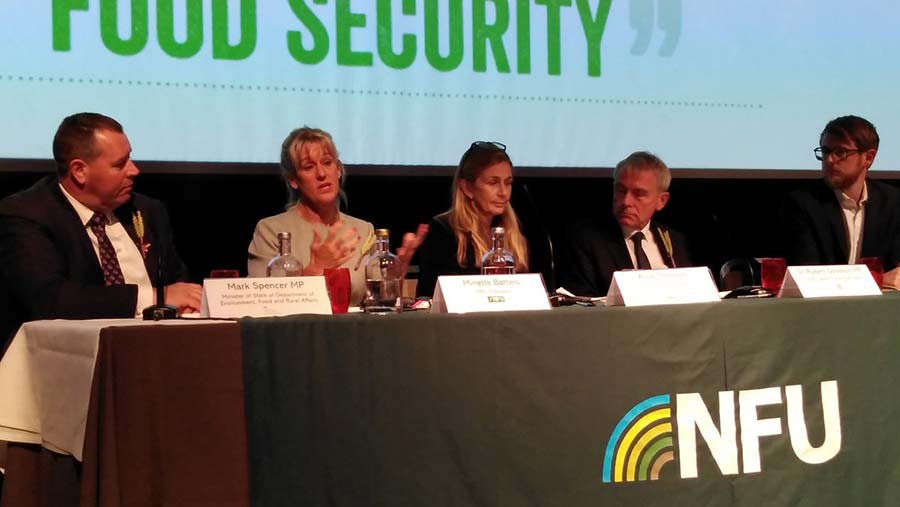MPs told to act now to expand seasonal farmworker numbers
 The NFU fringe event panel (left to right): Mark Spencer, Minette Batters, Alice Thompson, Sir Robert Goodwill and Patrick English © Philip Case
The NFU fringe event panel (left to right): Mark Spencer, Minette Batters, Alice Thompson, Sir Robert Goodwill and Patrick English © Philip Case Farmers have delivered an impassioned plea to Liz Truss’s government to expand the Seasonal Worker Scheme (SWS), allowing more foreign workers to travel to the UK to harvest crops.
Conservative MPs Mark Spencer and Sir Robert Goodwill were told by NFU president Minette Batters that it had been a “nightmare” trying to have constructive conversations with the Home Office to get them to understand the acute labour shortages affecting UK agriculture.
This year, the government expanded the SWS to allow 30,000 temporary migrants to come to the UK for up to six months, with a reserve of a further 10,000 visas if necessary.
See also: Truss plans to expand seasonal farm labour scheme welcomed
But the NFU and others say this figure falls far short of the 70,000-plus temporary workers that are needed in the UK each year to pick and pack ornamental and food crops.
During an NFU fringe event at the Conservative Party conference in Birmingham on Monday 3 October, farmers asked the MPs to urge ministers to act now and expand seasonal farmworker numbers for 2023, to offer stability to farm businesses hit by labour shortages and soaring energy costs.
Derek Wilkinson is managing director of Sandfields Farms, which grows more than 1,600ha of salad and other vegetables for the major retailers, and employs more than 1,500 staff across Warwickshire, Worcestershire and Kent.
Mr Wilkinson, who is also NFU Horticulture and Potatoes Board vice-chairman, said the labour shortage had cost the UK farming industry about £22m in wasted product this year, including £250,000 in his own business.
He told Mr Spencer, the Defra farm minister, that the government must provide details on its plans for seasonal farming labour in 2023 now – or the industry would be forced to contract.
“I don’t want to hear that we can get British workers. We’ve been through all that,” said Mr Wilkinson. “We need to be able to get migrant workers in our seasonal scheme and the scheme needs extending from six months to a minimum of nine months.”
Mr Spencer responded that Defra was engaged in a conversation with the Home Office about farm labour, which was “a positive move, going forward”.
No promises
But he added: “That is not a promise to deliver those extra numbers, but it’s certainly a promise to try.
“We understand the challenge that you are facing. I certainly understand that challenge. I will do everything I can to convince the Home Office to give you that certainty.”
Ali Capper, chairwoman of British Apples and Pears who also sits on the NFU Horticulture Board, said horticulture businesses were “not short of customers”, but were short of people to pick the crop, adding: “That’s the problem.”
The horticulture sector was also “on our knees” with high energy costs.
As well as not knowing what the labour market would be next year, farmers were having to price their bids now to supermarket tenders, without knowing what would happen to energy prices.
Mrs Capper said retailers “do not want to know” about the passing on of costs in her supply chain. “The businesses in my sector are all questioning their future. I’ve been representing this sector for a very long time.
“It is desperate. We must have answers on labour and we need answers on energy as well.”
Jayawardena farm visit
NFU president Minette Batters said the new Defra secretary, Ranil Jayawardena, had joined her on a visit to Phil and Liz Maddocks’ farm, PDM Produce, in Shropshire, on Sunday 2 October, to see workers cutting iceberg lettuce and spinach.
Mrs Batters said the sector was seeing huge levels of automation, but the dexterity of the human hand was still essential.
“That rig had nine people in it, picking 10 iceberg lettuces every 60 seconds,” she added. “That’s phenomenal efficiency, phenomenal levels of productivity. But you still need the dexterity of the hand.”
Patrick English, associate director at polling company YouGov, said there was a view that when the British public delivered its verdict on Brexit it wanted immigration to come down “at all costs” – but this was “not true”.
He said: “The public have a very nuanced view of immigration and that includes support for sector-by-sector support, allowing visas for sectors that need immigrant workers. We picked this up not just in farming, but in haulage as well.
“There are a lot of very easy policy wins, a lot of things the government could do which will get people on side, which would be supportive and help farmers and would play into this wider narrative of the British public wanting to see their local farmers protected.”
